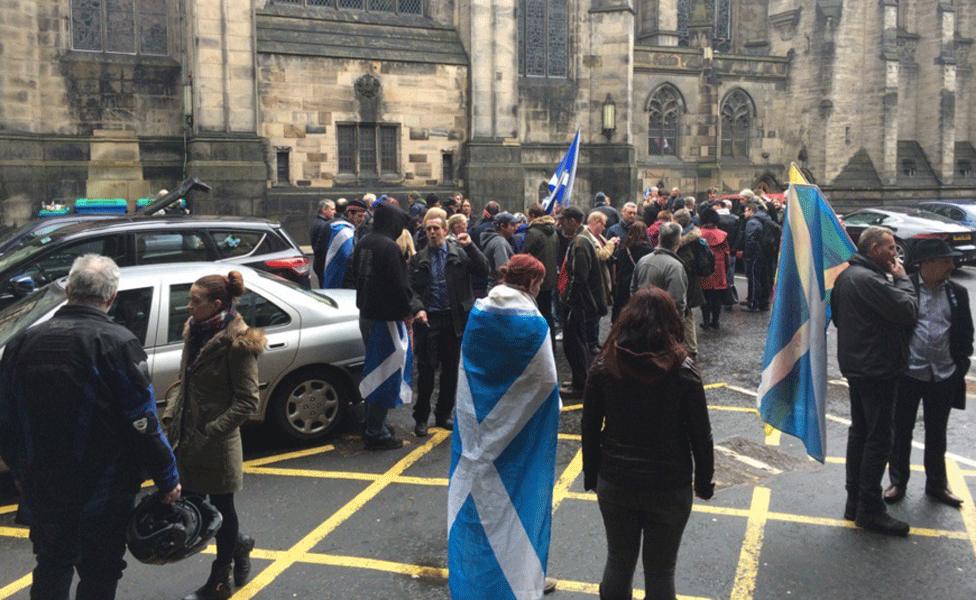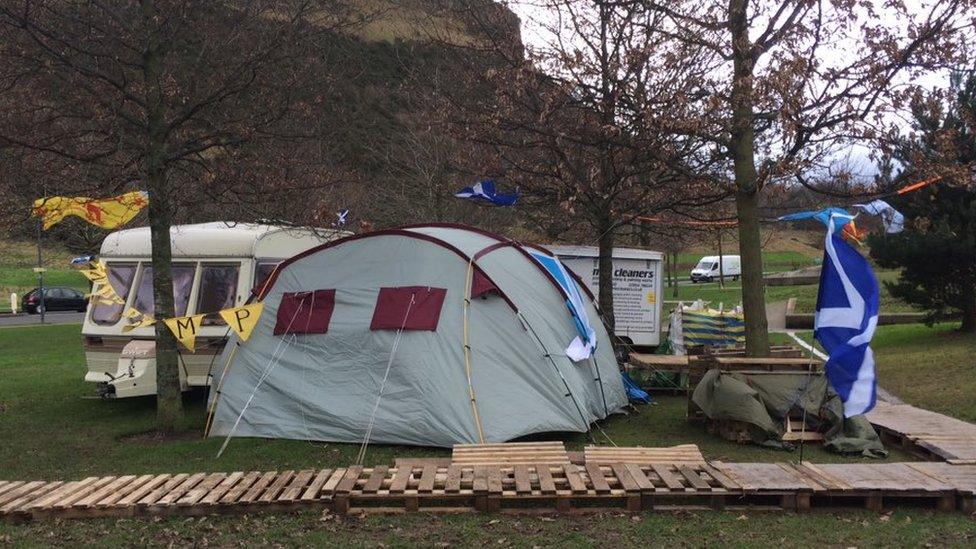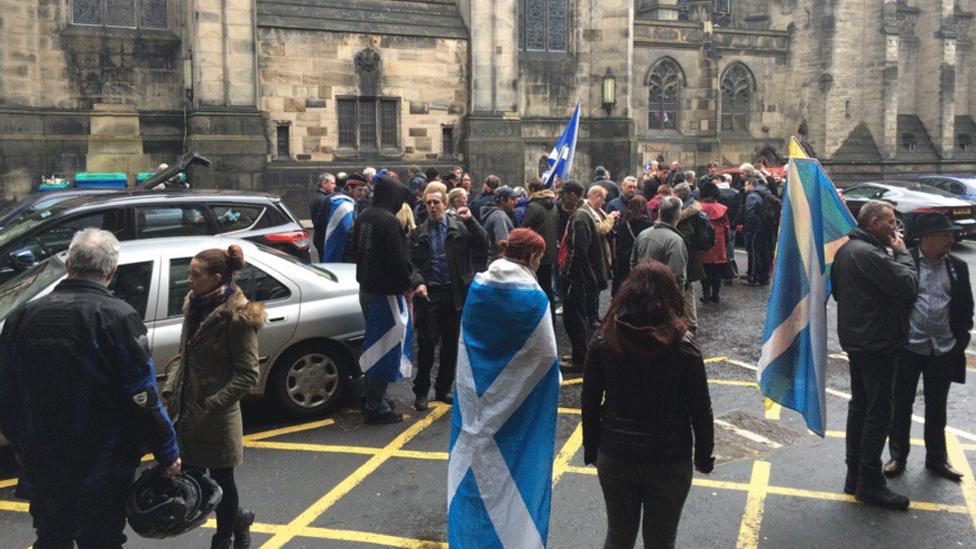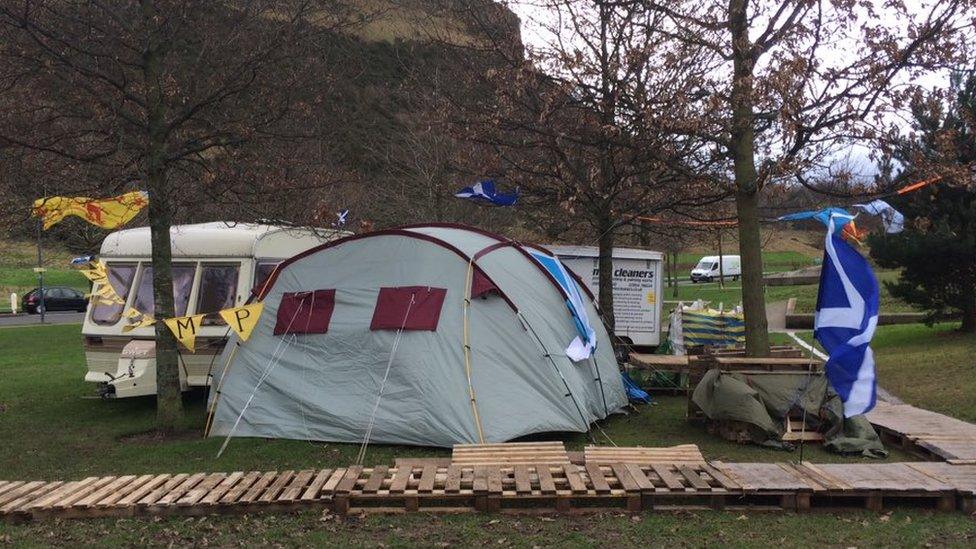Judge to issue written decision in IndyCamp eviction case
- Published

The independence campaigners have been taken to the Court of Session by the Scottish Parliament
A judge is to issue a written decision after hearing evidence about a Scottish Parliament bid to oust a group of independence campaigners from Holyrood.
The IndyCamp group have been holding a vigil outside the parliament since November 2015, and say they want to stay until Scotland is independent.
The parliament launched legal proceedings against them, saying they did not have permission to camp there.
Lord Turnbull said he would consider the case and issue a judgement later.
The Court of Session heard arguments from representatives of both groups, who dismissed each other's arguments as "irrelevant" and "incoherent".
Just under 100 camp activists gathered at the court for the hearing, on what would have been Scotland's "independence day" had the Yes side won the 2014 referendum.
Legal arguments
The IndyCamp group sought to fight the case based partially on the 1707 Act of Union, which created the United Kingdom, arguing that it was incompatible with the 1998 Scotland Act which established the Holyrood parliament.
Representative Patricia Polley said that the parliament would not exist without the "body public", arguing that it acting against the "utility" of Scottish people would be in violation of the 1707 act.
She said: "People of Scotland can't be subordinate to an unnatural corporate body."
The campers also tried to cite a UN declaration on the rights of indigenous peoples, claiming that the "indigenous Scots" camping at Holyrood should be afforded special protection.

The campaigners aim to remain in place until Scotland is declared independent from the UK
Ms Polley said parliament owning the "public land" which Holyrood stands on was "dispossessing" it from people who had enjoyed using it for centuries.
Parliament representative David Thomson noted that the declaration cited was a UN resolution, rather than a treaty, and thus creates no enforceable law.
The group later withdrew this point after Lord Turnbull pressed them on what an "indigenous" Scot would be, with Ms Polley at one stage agreeing that someone born in England or Africa could not be considered "indigenous" to Scotland.
The parliament contends that the group are camping without permission, are taking up space which others could be using, and could be compromising the political neutrality of the parliamentary estate.
Mr Thomson said the parliament was not seeking to prevent peaceful protest, but "permanent encroachment" on its land.
'Invading force'
A second respondent for the campers, a Mr Gemmill, contended that the title produced for the parliament building could be a "cut and paste", claiming that the building may in fact be owned by former Conservative MSP Murray Tosh.
He said he had attempted to cite Mr Tosh to appear at the hearing, but said he had "disappeared" and could not be traced.
Mr Gemmill also claimed that the Scotland Act "fails to see Scotland as an equal partner" and thus "nullifies Scots law", and argued that "Scottish courts are subservient to Westminster".
He described England as an "invading force" who was using the union for "enrichment", and said the Scottish Parliament had "invaded" the IndyCamp by sending messengers at arms to deliver court documents.
In a later exchange with Lord Turnbull, who said that much of Mr Gemmill's submission was "simply wrong", the latter said that "laws are for men", and contended that only God could choose which laws applied to men.
Closing a lengthy day of submissions after 18:00, Lord Turnbull said he would consider the arguments made and issue a written judgement in due course.
- Published9 March 2016

- Published7 January 2016

- Published17 December 2015
